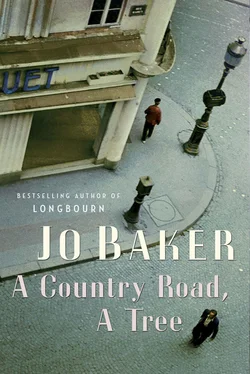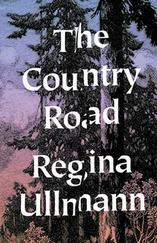“It’s not me that worries me.”
The old fellow grins, reveals quite the worst teeth he’s ever seen. “Maybe it should be, my friend.” A phlegmy sound, which might be a chuckle. “We’re all dangerous, we’re all contaminated. We’re all sales métèques as far as they’re concerned. And if they lock you up now, when those Nazi lads get here you’re dinner. Kaput.”
He baulks at the hard words, casually used: dirty foreigners. “I’ll have my papers soon.” His own voice sounds confident.
The old man lets smoke go, touches a thread of tobacco from his pale tongue, wistful. “I had papers once.”
“You don’t any more?”
The old fellow shakes his head. “All obsolete; all gone.”
“Can you get new ones?”
“There’s nobody left to grant me them. I have no country now; no rights. No one will hear me.”
“Oh God.”
The old man nods, drags again on the cigarette and it crumbles to a coal. He lets out an appreciative huff of smoke.
The urge to assist is visceral… the oldest hath borne most… but what can he do? This is massive and abstract and there is no way to get even a fingernail into it. He peers into the cigarette packet, shakes it, taps: there are three cigarettes left.
“Here.” He hands the packet over. He waves aside the thanks.
The old fellow fumbles the pack away before the offer can be retracted. “God bless you, sir.”
“God bless you.”
He turns away, rounding the corner on to rue d’Alleray, chewing at the inside of his cheek. The weather’s turning; it’s getting cold. Things can only get worse. His fingertips find the round limestone pebble from the shore at Greystones, smooth and cool as a mint between his fingertips. He lifts the stone and slips it between his lips. He watches his feet swing out ahead of him in his scuffed-up, exhausted boots, and sucks on the stone, while music rises and swells inside his head, the sad loveliness of the Winterreise.
Wundlicher Alter!
Sol lich mit dir geh’n?
He has an answer for his mother now, at least: no use whatsoever.
CHAPTER THREE PARIS, Winter 1939–40
Alfy is made strange by uniform, his flesh somehow transfigured, made more solid; his kepi rests on the café table, between the half-empty glasses, beside the half-full ashtray. His fingers play with a coaster, a cigarette smokes between his knuckles. He keeps his voice low and his eyes averted, as if he is himself abashed by his new state, by the thick green greatcoat around his barrel body. He is doing what he can do. He has enlisted. The professor will be shovelling out the stables for the cavalry.
Cavalry. It makes his eyes fall shut, his head shake in slow negation, just to hear it, just to think of it, obsolescent, an insane word for a modern war. For dear Christ’s sake: cavalry. It may as well be Calvary, for the sacrifice and slaughter that shadow it.
“I wanted to ask you,” Alfy’s saying. “While I’m gone, if you could keep an eye out for the family, for Mania and the boys.”
“Of course.”
“I know,” Alfy says. “I know you would anyway. I just needed to say the words. And if I don’t come back…”
“Ah God now, Alfy, don’t.”
“Because it doesn’t look good, if we are to be honest about it.” Alfy tilts his head, taps his ash into the ashtray. “So. If I don’t come back…”
“Alfy, no—”
“Consider them family, would you? Mania and the boys. That’s all I wanted to say. Would you do that for me, if I don’t come back?”
“Of course. Count on it. But do me a favour too.”
“Anything, my friend.”
“Come back.”
Alfy flashes his big grin; they part with a hand clasp, a kiss on the cheek. At the street corner he glances back at the stocky, uniformed figure, and his throat aches at the parting.
Alfred, his old friend, his new brother, leaves for his regiment; he, though, returns to his notebooks, to his desk, this pointless, circular work. Maybe he should try to enlist. He could shovel dung as well as anyone. It would be more worthwhile than this.
—
His friends drift.
Rootless anyway, the winds make hay with them; they are bundled up and off, tumbling and in disarray. They come and go; you wouldn’t know where anyone would be.
The Joyces are back, James and Nora arriving at the station in a noisy huddle cluttered round with bags and cases. Both he and Paul Léon are there to meet them, to help, but still it is all short temper and frayed nerves, bloody-mindedness and frailty. Mr. Joyce with his smouldering cheroot and his stick and his dark glasses, questions for Léon about what’s going on with Giorgio, enquiries about books: the man is entirely disengaged from the moment and its imperatives. Nora’s complaining is a constant exhalation like the steam engine. They have been in Brittany to make arrangements for their daughter, to see her settled out of harm’s way. Though whether harm’s way can ever be quite avoided by Lucia is uncertain, since she carries so much harm around inside herself.
Léon goes in search of a porter and they head towards the cabs. Following the bickering couple, his own face flushes at the recollection of fractured, thwarted Lucia. His blunt failure at love.
He and Paul get them settled in the cab and then return across the concourse, heading for the Métro.
“They are to pack up the apartment, do you know?” Paul says. “Nora insists on an hotel.”
Paul is so benign, so mild, and yet there is a sweet one-upmanship to this; an almost-schoolboy I know something you don’t know.
“Switzerland, then,” he says, expecting to annoy.
“It’s an obvious choice, isn’t it? They could both get the proper treatment there — the father and the daughter. Perhaps the situation is not all bad, since it will force the issue for them.”
They’re approaching the entrance to the Métro; he glances round at Paul’s milk-smooth face, its gentle intelligence. That his admiration for James Joyce extends to this — that a benefit to the family could add a hint of silver to the thundercloud of war. They descend the steps, and their boots clip allegro down the worn wooden treads. Paul’s are the same style as his, he sees, though shiny still, and stiff; there’s a flinch to his walk.
“New boots?” he asks. “Do they pinch?”
“Still wearing them in.”
“Mine wear out before I can wear them in.”
They step in parallel from the bottom tread on to the tiled floor, and their boots swing along together. Joyce’s favouring of the style has made them popular.
Paul says, confiding: “Oh, my feet, good God.”
—
Not everyone is in transit. Mary Reynolds stays on in her house in the rue Hallé; she and Marcel Duchamp have their gatherings still; they have cards and conversation. Parties still happen. In one room, a wall is painted dark blue and stuck with pins and a tracery of string; her globe stands smooth in the shadows. There are maps and books and paintings and bright fires, and with the conversation and the glass of fine and the little dishes of olives, you would think this was for ever; you wouldn’t know that the axis of the world had already tipped and that everything was sliding towards disaster.
But even on the rue Hallé, there is talk of departure. Marcel talks of it. Mary doesn’t bring up the subject herself, but then neither does she contest it. Head south, Marcel says, which they would do anyway in summer; but go early, be gone before the dam breaks. Because Paris will bear the brunt and break the wave of the advance. So they will head to the south-west, to the coast, to the house in Arcachon. Distance will protect them.
Читать дальше










